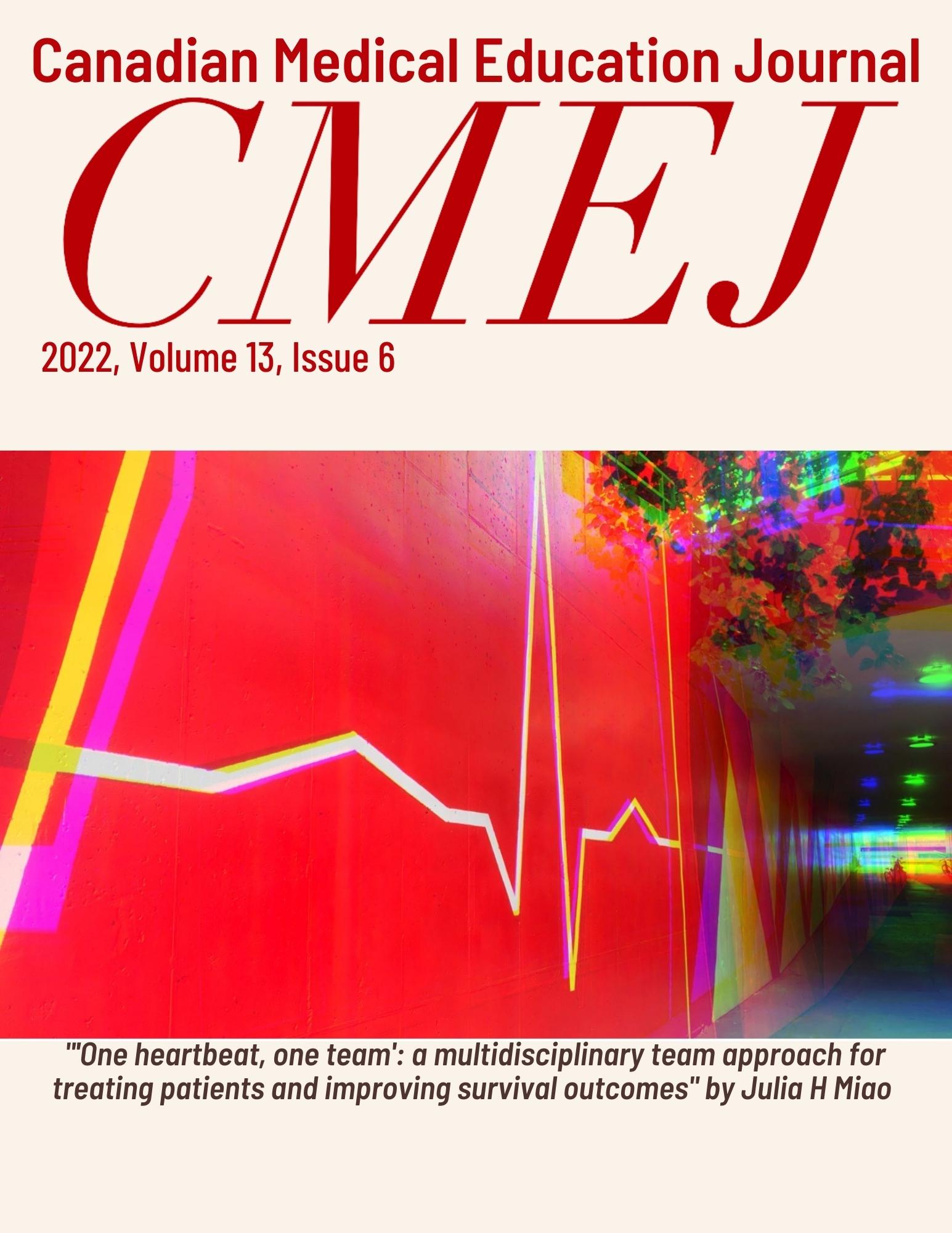Understanding the near-peer relationship: resident perspectives around a novel on-call workplace-based assessment
DOI:
https://doi.org/10.36834/cmej.73164Abstract
Background: Workplace-based assessment (WBA) is a critical component of competency-based medical education (CBME), though literature on WBA for overnight call is limited. We evaluated a WBA tool completed by supervising subspecialty trainees on paediatric residents during subspecialty overnight call, for usefulness facilitating feedback/coaching in this setting.
Methods: Web-based surveys were sent to residents pre- and post-WBA tool implementation monthly for four months (August-December 2018), exploring feedback frequency, Likert-scaled opinions of tool feasibility/usefulness facilitating feedback, and qualitative experiences. Assessor comments were categorized as actionable/non-actionable. Quantitative data was summarized using descriptive statistics. Qualitative data was coded to identify themes.
Results: Total response rates averaged 41% (total 25 responses, average five respondents/12 residents on-call each month). Post-implementation (n = 16 responses), a non-sustained trend of increased Medical Expert feedback was observed. Residents were generally divided or disagreed on tool usefulness facilitating feedback and feasibility. Comments contained actionable feedback in < 10% of completed WBAs. Qualitative analysis revealed barriers to tool-facilitated coaching including: feedback quality and setting/environment, role of senior near-peer as assessor, interpersonal burden in encounters, and tool-specific issues.
Conclusions: Increasing frequency of WBA tool completion is not sufficient to achieve CBME goals. Factors impacting feedback/coaching within the resident/near-peer dyad must be addressed.
References
Frank JR, Snell LS, Cate OT, et al. Competency-based medical education: theory to practice. Med Teach. 2010 Aug;32(8):638–45. https://doi.org/10.3109/0142159X.2010.501190
RCPSC. Understanding workplace-based assessment and CBD 2017 Available from: www.royalcollege.ca/cbd [Accessed on Jun 2, 2020].
Watling CJ, LaDonna KA. Where philosophy meets culture: exploring how coaches conceptualise their roles. Med Educ. 2019 May;53(5):467–76. https://doi.org/10.1111/medu.13799
Graddy R, Wright S. Going the extra mile: lessons learned from running coaches applied to medicine. Educ Health. 2017;30(1):89–92. https://doi.org/10.4103/1357-6283.210498
Orr C, Sonnadara R. Coaching by design: exploring a new approach to faculty development in a competency-based medical education curriculum. Adv Med Educ Pract. 2019 May;10:229–44. https://doi.org/10.2147/AMEP.S191470
Huda N, Faden L, Goldszmidt M. Entrustment of the on-call senior medical resident role: implications for patient safety and collective care. BMC Med Educ. 2017 Dec;17(1). https://doi.org/10.1186/s12909-017-0959-3
Walzak A, Butler D, Bates J, Farrell L, Law SFB, Pratt DD. Working in the dead of night: exploring the transition to after-hours duty. Med Educ. 2019 Mar;53(3):296–305. https://doi.org/10.1111/medu.13762
Burm S, Chahine S, Goldszmidt M. “doing it right” overnight: a multi-perspective qualitative study exploring senior medical resident overnight call. J Gen Intern Med. 2021 Apr;36(4):881–7. https://doi.org/10.1007/s11606-020-06284-1
Ganguli S, Camacho M, Yam CS, Pedrosa I. Preparing first-year radiology residents and assessing their readiness for on-call responsibilities: results over 5 years. Am J Roentgenol. 2009 Feb;192(2):539–44. https://doi.org/10.2214/AJR.08.1631
Kahol K, Leyba MJ, Deka M, et al. Effect of fatigue on psychomotor and cognitive skills. Am J Surg. 2008 Feb;195(2):195–204. https://doi.org/10.1016/j.amjsurg.2007.10.004
Rassos J, Ginsburg S, Stalmeijer RE, Melvin LJ. The senior medical resident’s new role in assessment in internal medicine. Acad Med. 2021 Dec 7. Publish Ahead of Print. Available from: https://journals.lww.com/10.1097/ACM.0000000000004552. [Accessed on Feb 11, 2022]/
Ten Cate O, Durning S. Peer teaching in medical education: twelve reasons to move from theory to practice. Med Teach. 2007 Jan;29(6):591–9. https://doi.org/10.1080/01421590701606799
Bell AE, Meyer HS, Maggio LA. getting better together: a website review of peer coaching initiatives for medical educators. Teach Learn Med. 2020 Jan 1;32(1):53–60. https://doi.org/10.1080/10401334.2019.1614448
The Royal College of Physicians and Surgeons of Canada. CanMEDS Framework. Available from: http://www.royalcollege.ca/rcsite/canmeds/canmeds-framework-e [Accessed on May 26, 2019].
Braun V, Clarke V. Using thematic analysis in psychology. Qual Res Psychol. 2006 Jan;3(2):77–101. https://doi.org/10.1191/1478088706qp063oa
Morse J. The significance of saturation. Qual Health Res. 5(2):147–9. https://doi.org/10.1177/104973239500500201
Dath D, Iobst W, For the International CBME Collaborators. The importance of faculty development in the transition to competency-based medical education. Med Teach. 2010 Aug;32(8):683–6. https://doi.org/10.3109/0142159X.2010.500710
Holmboe ES, Ward DS, Reznick RK, et al. Faculty development in assessment: the missing link in competency-based medical education. Acad Med. 2011 Apr;86(4):460–7. https://doi.org/10.1097/ACM.0b013e31820cb2a7
Watling CJ, Ginsburg S. Assessment, feedback and the alchemy of learning. Med Educ. 2019 Jan;53(1):76–85. https://doi.org/10.1111/medu.13645
Wenrich MD, Jackson MB, Maestas RR, Wolfhagen IHAP, Scherpbier AJJ. From cheerleader to coach: the developmental progression of bedside teachers in giving feedback to early learners. Acad Med. 2015 Nov;90:S91–7. https://doi.org/10.1097/ACM.0000000000000901
Beasley HL, Ghousseini HN, Wiegmann DA, Brys NA, Pavuluri Quamme SR, Greenberg CC. Strategies for building peer surgical coaching relationships. JAMA Surg. 2017 Apr 19;152(4):e165540. https://doi.org/10.1001/jamasurg.2016.5540
LaDonna KA, Hatala R, Lingard L, Voyer S, Watling C. Staging a performance: learners’ perceptions about direct observation during residency. Med Educ. 2017 May;51(5):498–510.
https://doi.org/10.1111/medu.13232
Patel P, Martimianakis MA, Zilbert NR, et al. Fake it ’til you make it: pressures to measure up in surgical training. Acad Med. 2018 May;93(5):769–74. https://doi.org/10.1097/ACM.0000000000002113
Sawatsky AP, Huffman BM, Hafferty FW. Coaching versus competency to facilitate professional identity formation. Acad Med. 2020 Oct;95(10):1511–4. https://doi.org/10.1097/ACM.0000000000003144
Downloads
Published
Issue
Section
License
Copyright (c) 2022 Amy D Lu, Adelle R Atkinson, Julie C Johnstone

This work is licensed under a Creative Commons Attribution-NonCommercial-NoDerivatives 4.0 International License.
Submission of an original manuscript to the Canadian Medical Education Journal will be taken to mean that it represents original work not previously published, that it is not being considered elsewhere for publication. If accepted for publication, it will be published online and it will not be published elsewhere in the same form, for commercial purposes, in any language, without the consent of the publisher.
Authors who publish in the Canadian Medical Education Journal agree to release their articles under the Creative Commons Attribution-Noncommercial-No Derivative Works 4.0 Canada Licence. This licence allows anyone to copy and distribute the article for non-commercial purposes provided that appropriate attribution is given. For details of the rights an author grants users of their work, please see the licence summary and the full licence.











